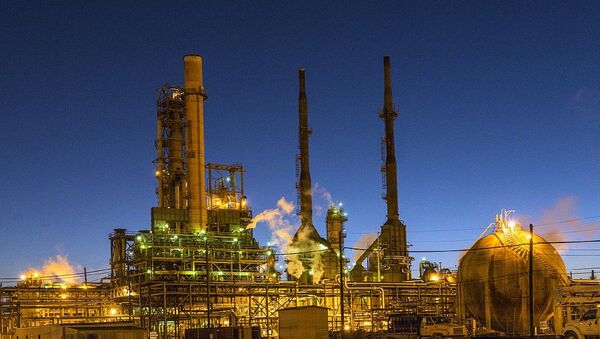Radio Sputnik discussed the prospects of Super-OPEC initiative with Oliver Klaus, Dubai bureau chief at Energy Intelligence, Powerful Thinking for the Global Energy Industry.
Sputnik: What are the prospects of a Super-OPEC initiative?
Oliver Klaus: The psychology behind the whole deal goes back to bargaining over the oil price lawn then OPEC's effort to bring non-OPEC countries, especially Russia of course as the largest producer, to join them in basically creating some form of collaboration framework that enables them to manage the market.
READ MORE: Russia to Boost Oil Output, Invited as Observer to OPEC
I think this is what's really driving the threat now, this interest in keeping not the deal that we have alive but keeping that collaboration alive and enabling producers to respond to markets in a coordinated fashion different than required.
Because this is essentially an industry with a long-term outlook, you commit to huge amounts of investments over a long period of time and if you have a lot of up and down cycles in that time that's a problem for the industry, it makes planning much harder. And so I think this initiative if it indeed materializes it's going to be almost a game changer for the global oil market.
Sputnik: If Riyadh and Moscow manage to create this Super-OPEC, what reaction can we expect from the United States?
Oliver Klaus: It depends on if we say the US it's not exactly the same as if you say, Saudi Arabia. In Saudi Arabia, you have essentially Saudi Aramco, a national oil company which is owned by the government and it has a socioeconomic role to play in the country, it's not just an oil producer.
If we look at the US producers, first of all, they are looking at maximizing returns, acting in the interest of the shareholders so I think they will basically have to continue to operate in the way that the market dictates, they respond to market forces. So in terms of share producers in particular, as long as prices remain at the level that allows them to produce and to increase production, that's what they're going to do.
READ MORE: OPEC Launches Mobile App With Monthly Oil Market Data — UAE Energy Minister
Of course, if we talk about the US at the political level in terms of the president tweeting about oil prices, that's a slightly different story, but for the US producers I think ultimately they've shown a great deal of flexibility in adapting to changing market conditions, they have shown an ability to operate in a lower price environment. When people thought the US share producers will be knocked out when oil process had fallen to $35 a barrel, a lot of them showed that technical innovation can really bring down prices at a pretty quick scale and I think that's what happened.
So I would the US producers to continue doing what they're doing depending on what the market asks them. If oil prices should continue to rise we may see a reaction from the US President of course again which could prompt at least some OPEC members to try and take action in terms of possibly trying to argue for more supplies.
Sputnik: Reacting to the decision taken in Vienna, could oil prices have fallen? What's your prognosis regarding the oil prices in the near term?
So the commitment there is to add another million barrels per day; the market responded to this, they have tried to figure out how much this will actually add in terms of barrels to be added. I think it's cooled the market the fact that OPEC and non-OPEC have responded to what we've seen in recent weeks in terms of high price levels that's definitely sent out a signal that has helped cool the prices, that was to be expected.
The views and opinions expressed by the speaker do not necessarily reflect those of Sputnik.



